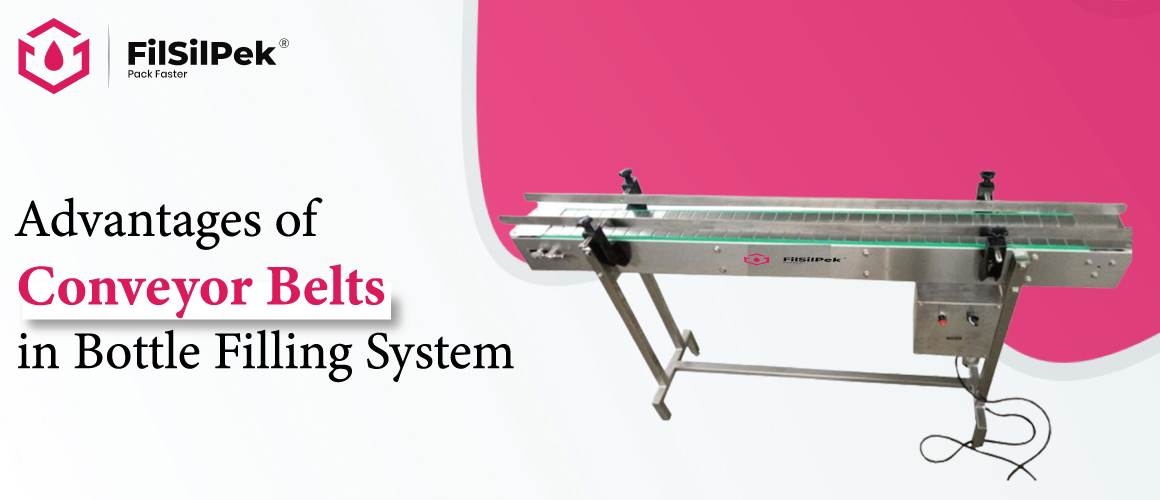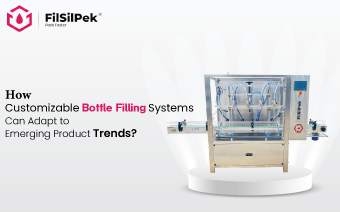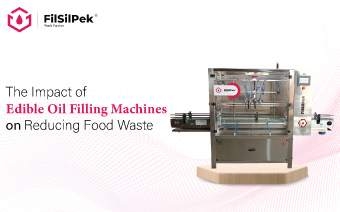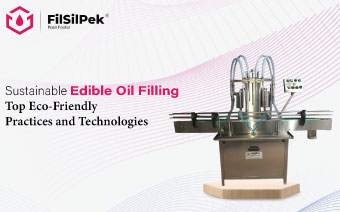Advantages of Conveyor Belts in Bottle Filling System
Conveyor belts might seem like a basic part of a bottle filling system, but they’re far more integral to the process than most realise. These belts are the backbone of modern manufacturing lines, ensuring that bottles move smoothly from one stage to the next without hiccups. In high-speed production environments, conveyor belts aren’t just about moving bottles—they’re about maintaining a seamless, consistent flow that keeps the entire operation running like a well-oiled machine.
In this article, we will take a look at the role of conveyor belts in bottle filling systems and how they are advantageous during the whole process.
Role of Conveyor Belts in Bottle Filling Systems
Conveyor belts are the heart of a bottle filling system, taking on the critical task of moving bottles through every stage of the process. Let’s understand how it works.
The conveyor belt starts by transporting empty bottles from the entry point of the production line to the filling station. As the bottles move along the belt, they are spaced and aligned perfectly, ready for the filling nozzles to dispense the exact amount of product into each one. This ensures that every bottle is filled with precision, minimising waste and maintaining product quality.
But the role of the conveyor belt doesn’t stop there. After filling, the belt continues to move the bottles to the capping station, where caps are securely placed on each one.
Next, the conveyor belt guides the bottles to the labelling station, ensuring they’re correctly positioned for labels to be applied.
Finally, the filled, capped, and labelled bottles are transported to the packaging area, ready for shipment.
Throughout the entire process, the conveyor belt plays a crucial role in keeping the production line efficient, preventing delays, and ensuring that each bottle is handled with consistency from start to finish.
5 Unique Advantages of Conveyor Belts in Bottle Filling Systems
Conveyor belts might seem like a simple part of the process, but they offer some unique and technical advantages that go beyond just moving bottles from point A to point B. Let’s break down why they’re so essential.
1. Precision Alignment
One of the standout features of conveyor belts in bottle filling systems is their ability to ensure precision alignment. As bottles move along the belt, they’re kept in perfect formation, making sure that each bottle is exactly where it needs to be when it’s time to fill, cap, or label. This precision is crucial for avoiding spills, overfills, and other costly mistakes that can slow down production and waste product.
2. Seamless Integration with Automation
Conveyor belts are designed to work hand-in-hand with automated systems, creating a fully synchronised production line. They can be programmed to adjust speed, direction, and spacing based on the specific needs of your operation. This flexibility means the conveyor belt can adapt in real-time, responding to changes in production speed or bottle size without missing a beat, keeping the entire system running smoothly.
3. Durability and Low Maintenance
These belts are built to withstand the rigours of a fast-paced production environment. Made from high-quality materials, they’re designed to handle continuous operation with minimal wear and tear. This durability translates into less downtime for maintenance, which means your production line stays up and running longer. Plus, with easy maintenance procedures, any necessary repairs or adjustments can be done quickly, further reducing interruptions.
4. Enhanced Product Handling
Conveyor belts also play a key role in gentle product handling. They’re engineered to move bottles smoothly and steadily, reducing the risk of breakage or damage, especially with more delicate or oddly-shaped bottles. This careful handling is critical in maintaining product integrity from start to finish, ensuring that every bottle reaches the end of the line in perfect condition.
5. Space Optimization
Finally, conveyor belts help optimise space in your production facility. They can be customised to fit into tight spaces, navigate around equipment, or even move vertically if needed. This flexibility allows you to make the most of your available floor space, making your entire operation more efficient and cost-effective.
Conclusion
While automation offers numerous benefits, its implementation also presents several challenges. Manufacturers must carefully consider these challenges to ensure a smooth transition to automated capping systems. From high initial investment to maintenance requirements, dependence on technology, and cybersecurity risks, manufacturers must be aware of the potential obstacles and develop strategies to overcome them
1. High Initial Investment in Hardware and Software
Implementing automated capping systems requires significant upfront costs, including hardware, software, and integration expenses. This can be a barrier for small-scale manufacturers.
2. Maintenance and Repair Requirements
Automated systems require regular maintenance and occasional repairs, which can lead to production downtime. Manufacturers must ensure they have adequate maintenance resources and spare parts.
3. Training and Skilled Labor for Operation and Maintenance
Operating and maintaining automated capping systems demands specialised training and skilled labour. Manufacturers must invest in ongoing training and development programs.
4. Integration with Existing Systems and Equipment
Integrating automated capping systems with existing production lines can be complex and time-consuming. Manufacturers must ensure compatibility and seamless integration.
5. Dependence on Technology and Cybersecurity Risks
Over-reliance on automation can make manufacturers vulnerable to technological failures and cybersecurity risks. Manufacturers must implement robust cybersecurity measures and have contingency plans in place.
Conclusion
So, that’s a wrap on the amazing world of automated capping systems! We hope you’re as excited as we are about the incredible benefits they bring to packaging. If you’re ready to shake things up and take your production line to new heights, we’re here to help.Conveyor belts are more than just a way to move bottles—they’re the key to making your bottle filling system efficient, precise, and reliable. If you’re looking to upgrade your production line or want to explore how conveyor belts can boost your operation, the experts at Filsilpek are here to help. Reach out to us at [email protected], and let’s take your bottling process to the next level!
How Customizable Bottle Filling Systems Can Adapt to Emerging Product Trends?
Product and packaging trends are evolving rapidly across industries like food and beverage…
The Impact of Edible Oil Filling Machines on Reducing Food Waste
Food waste is a significant global issue, with millions of tons of food discarded each year…
Sustainable Edible Oil Filling: Top Eco-Friendly Practices and Technologies
Sustainability in edible oil filling is an evolving field that focuses on minimising environmental impact throughout…



